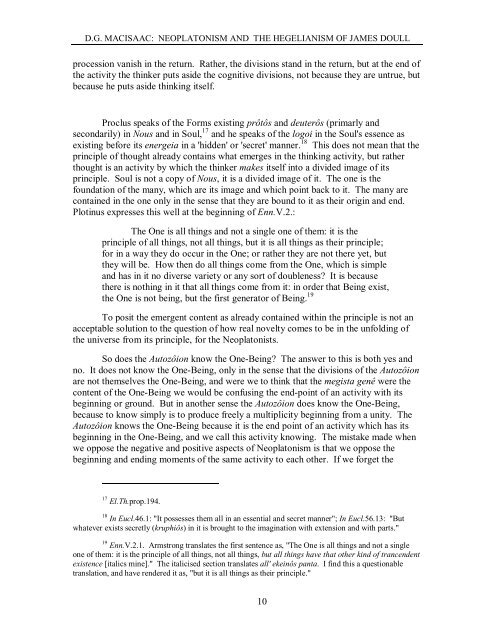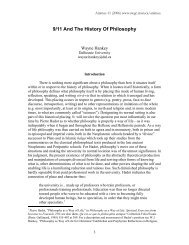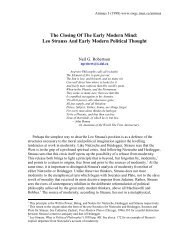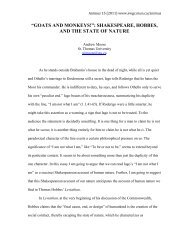Neoplatonism And The Hegelianism Of James Doull1
Neoplatonism And The Hegelianism Of James Doull1
Neoplatonism And The Hegelianism Of James Doull1
Create successful ePaper yourself
Turn your PDF publications into a flip-book with our unique Google optimized e-Paper software.
D.G. MACISAAC: NEOPLATONISM AND THE HEGELIANISM OF JAMES DOULLprocession vanish in the return. Rather, the divisions stand in the return, but at the end ofthe activity the thinker puts aside the cognitive divisions, not because they are untrue, butbecause he puts aside thinking itself.Proclus speaks of the Forms existing prôtôs and deuterôs (primarly andsecondarily) in Nous and in Soul, 17 and he speaks of the logoi in the Soul's essence asexisting before its energeia in a 'hidden' or 'secret' manner. 18 This does not mean that theprinciple of thought already contains what emerges in the thinking activity, but ratherthought is an activity by which the thinker makes itself into a divided image of itsprinciple. Soul is not a copy of Nous, it is a divided image of it. <strong>The</strong> one is thefoundation of the many, which are its image and which point back to it. <strong>The</strong> many arecontained in the one only in the sense that they are bound to it as their origin and end.Plotinus expresses this well at the beginning of Enn.V.2.:<strong>The</strong> One is all things and not a single one of them: it is theprinciple of all things, not all things, but it is all things as their principle;for in a way they do occur in the One; or rather they are not there yet, butthey will be. How then do all things come from the One, which is simpleand has in it no diverse variety or any sort of doubleness? It is becausethere is nothing in it that all things come from it: in order that Being exist,the One is not being, but the first generator of Being. 19To posit the emergent content as already contained within the principle is not anacceptable solution to the question of how real novelty comes to be in the unfolding ofthe universe from its principle, for the Neoplatonists.So does the Autozôion know the One-Being? <strong>The</strong> answer to this is both yes andno. It does not know the One-Being, only in the sense that the divisions of the Autozôionare not themselves the One-Being, and were we to think that the megista genê were thecontent of the One-Being we would be confusing the end-point of an activity with itsbeginning or ground. But in another sense the Autozôion does know the One-Being,because to know simply is to produce freely a multiplicity beginning from a unity. <strong>The</strong>Autozôion knows the One-Being because it is the end point of an activity which has itsbeginning in the One-Being, and we call this activity knowing. <strong>The</strong> mistake made whenwe oppose the negative and positive aspects of <strong>Neoplatonism</strong> is that we oppose thebeginning and ending moments of the same activity to each other. If we forget the17 El.Th.prop.194.18 In Eucl.46.1: "It possesses them all in an essential and secret manner"; In Eucl.56.13: "Butwhatever exists secretly (kruphiôs) in it is brought to the imagination with extension and with parts."19 Enn.V.2.1. Armstrong translates the first sentence as, "<strong>The</strong> One is all things and not a singleone of them: it is the principle of all things, not all things, but all things have that other kind of trancendentexistence [italics mine]." <strong>The</strong> italicised section translates all' ekeinôs panta. I find this a questionabletranslation, and have rendered it as, "but it is all things as their principle."10
















